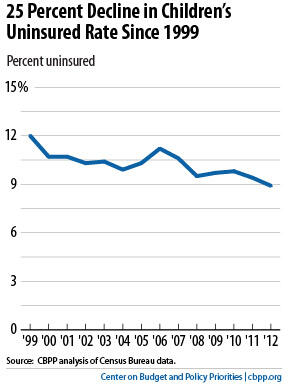BEYOND THE NUMBERS
The President and Congress need to extend four important Medicaid and Children’s Health Insurance Program (CHIP) provisions that are expiring and that provide health coverage to families leaving welfare for work, assist low-income seniors and people with disabilities with their Medicare premiums, and increase enrollment of eligible low-income children in Medicaid and CHIP, as we explain in a new paper. Policymakers should extend them in end-of-year legislation that they enact either this month or next.
This week, the Senate Finance Committee and the House Ways and Means Committee are expected to draft legislation that would permanently avert scheduled cuts in payments to doctors under Medicare; if policymakers include such a measure as part of end-of-year legislation, they also should make the four expiring Medicaid and CHIP provisions permanent in the same legislation.
The four provisions are:
Transitional Medical Assistance (TMA): TMA enables some low-income families that would otherwise lose Medicaid because their earnings have risen (or because they are receiving more child support) to get up to 12 months of temporary Medicaid coverage. TMA, which expires on December 31, has become a critical source of health care coverage for a substantial number of low-income working families. It’s particularly important to parents in states that aren’t expanding Medicaid but have the opportunity to work their way off welfare but could lose their Medicaid by taking a low-wage job that lifts their income over their state’s Medicaid income threshold, without gaining affordable coverage through their employer.
Qualifying Individuals Program (QI): Under QI, which also expires on December 31, states receive federal funding to defray Medicare Part B premiums for beneficiaries with incomes between 120 percent and 135 percent of the poverty line. About 520,000 near-poor elderly and disabled people received this assistance in fiscal year 2011. Without an extension, low-income seniors and people with disabilities will lose QI benefits that cover the full cost of their Part B premiums, which totaled $1,259 in in 2013.
CHIPRA Performance Bonuses: Under the 2009 Children’s Health Insurance Program Reauthorization Act (CHIPRA), states can receive annual “performance bonuses” by implementing strategies that make it easier for states to enroll eligible low-income children in Medicaid and CHIP and reaching state-specific targets for boosting Medicaid enrollment among eligible children. The bonuses are designed to offset some state costs in enrolling more eligible children.

For fiscal year 2012, 23 states received about $300 million in bonuses. The simplifications that states instituted have contributed to coverage gains among children; in 2012 — a year in which nearly half of states instituted one or more simplification procedure — the share of children without health coverage reached a historic low of 8.9 percent, according to Census data, marking a 25 percent reduction since 1999 (see chart).
The CHIPRA performance bonuses expired at the end of September. Continuing their availability will help maintain progress in shrinking the numbers of uninsured low-income children.
Express Lane Eligibility (ELE): Under ELE, states can use eligibility information from other low-income programs — such as SNAP (formerly known as food stamps) — to streamline enrollment of eligible children in Medicaid and CHIP. ELE taps information on income, household size, and other eligibility factors that a state agency has already collected to determine an individual’s eligibility for another low-income program, rather than collecting and evaluating the same information all over again for Medicaid or CHIP.
As of July 2013, 12 states (and the Virgin Islands) had taken the ELE option for Medicaid or CHIP, or both. ELE saved states time and reduced their administrative costs, while increasing the enrollment of eligible children, the Government Accountability Office found in a recent performance audit. While ELE doesn’t expire until the end of fiscal year 2014, extending it now will assure states that it will remain in place and thereby encourage more states to take it. That’s why the December 2012 “fiscal cliff” budget agreement included an early extension of ELE through 2014, when the ELE was scheduled to expire at the end of fiscal year 2013.
Click here for the full paper.
